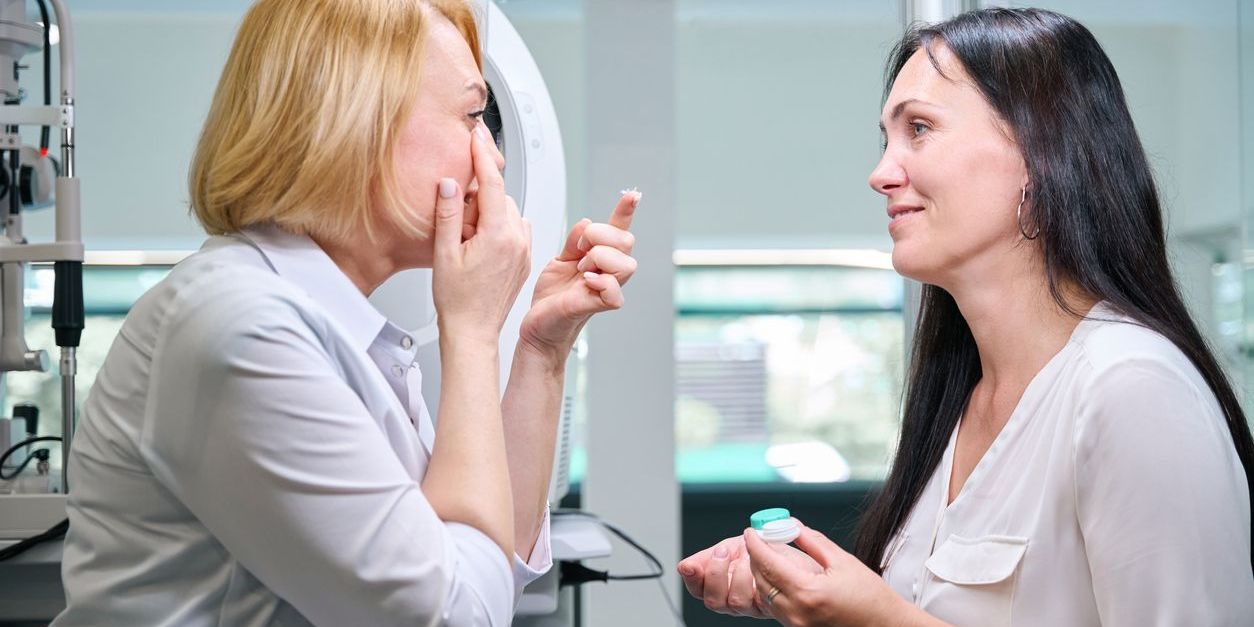What is a Contact Lens Specialist?
A contact lens specialist is an eye doctor, usually an optometrist or ophthalmologist, who has extra training in fitting and managing contact lenses. They make sure patients get lenses that not only correct vision but are also safe and comfortable to wear. Wearing the wrong lenses or having a poor fit can cause eye irritation, infections, or even damage to the cornea, so their expertise helps keep eyes healthy.
What does a Contact Lens Specialist do?

Duties and Responsibilities
The duties and responsibilities of a contact lens specialist focus on helping patients achieve clear, comfortable, and safe vision through contact lenses. Key responsibilities include:
- Comprehensive Assessment: Carefully evaluate each patient’s eyes, vision needs, and lifestyle to determine the most suitable type of contact lenses. This includes checking for conditions like dry eyes, astigmatism, or other eye health issues that may affect lens choice.
- Fitting and Prescribing Lenses: Select and fit lenses that provide the best vision while ensuring comfort and proper alignment. This may involve trying different lens types or brands until the patient finds the best fit for daily use.
- Patient Education: Teach patients how to insert, remove, clean, and store their lenses safely. Specialists also guide patients on proper wearing schedules and how to avoid common problems like irritation or infections.
- Monitoring and Follow-Up: Regularly check on patients to make sure their lenses are working well and their eyes remain healthy. Adjust prescriptions or recommend different lens types when needed to maintain comfort and clear vision.
- Problem-Solving: Identify and manage any lens-related issues, such as redness, dryness, or infections. They provide advice, treatment, or referrals if the patient experiences complications.
- Collaboration: Work closely with other eye care professionals, like optometrists or ophthalmologists, to ensure patients with complex eye conditions receive comprehensive care.
Different Types of Contact Lens Specialists
While all contact lens specialists share core skills, many focus on particular patient needs and conditions or specialized lens types, allowing them to provide customized solutions beyond standard lenses:
- General Contact Lens Specialists fit standard soft lenses and handle routine prescriptions for everyday vision correction.
- Rigid Gas-Permeable (RGP) Lens Specialists focus on fitting hard lenses for patients needing sharper vision or those with specific conditions like astigmatism.
- Scleral Lens Specialists specialize in large-diameter lenses that vault over the cornea, often used for irregular corneas, keratoconus (an eye disorder in which the cornea, the transparent front part of the eye, gradually thins and bulges outward into a cone shape), or severe dry eye.
- Pediatric Contact Lens Specialists work with children, including those with myopia (nearsightedness) or requiring lenses for developmental eye conditions.
- Specialty/Medical Contact Lens Specialists deal with complex or post-surgical eyes, such as patients with corneal transplants, trauma, or post-refractive surgery needs.
- Orthokeratology (Ortho-K) Specialists fit overnight lenses that temporarily reshape the cornea to reduce refractive errors like myopia.
Contact lens specialists have distinct personalities. Think you might match up? Take the free career test to find out if contact lens specialist is one of your top career matches. Take the free test now Learn more about the career test
What is the workplace of a Contact Lens Specialist like?
Contact lens specialists can work for a variety of eye care and healthcare entities. These are among their most common employers:
- Private Optometry Practices – clinics that provide routine and specialty contact lens fittings
- Ophthalmology Clinics – especially those focused on corneal disorders, refractive surgery, or complex eye conditions
- Specialty Contact Lens Centers – clinics that focus exclusively on advanced or medical contact lenses, such as scleral or keratoconus lenses
- Hospitals and Eye Care Centers – particularly in departments treating post-surgical patients or complex ocular diseases
- Research and Academic Institutions – conducting clinical research or teaching, advancing contact lens technology and fitting techniques
- Vision Care Companies – working with manufacturers or distributors to develop or test new lens designs
The workplace of a contact lens specialist is typically a clinical setting equipped for eye examinations and lens fittings. The environment usually features diagnostic instruments such as slit lamps, keratometers, corneal topographers, and lens trial sets for fitting. Specialists spend much of their day interacting with patients.
Frequently Asked Questions
Optometry and Ophthalmology-Related Careers and Degrees
Contact lens Specialists are also known as:
Contact Lens Optometrist
Contact Lens Practitioner
Contact Lens Clinician